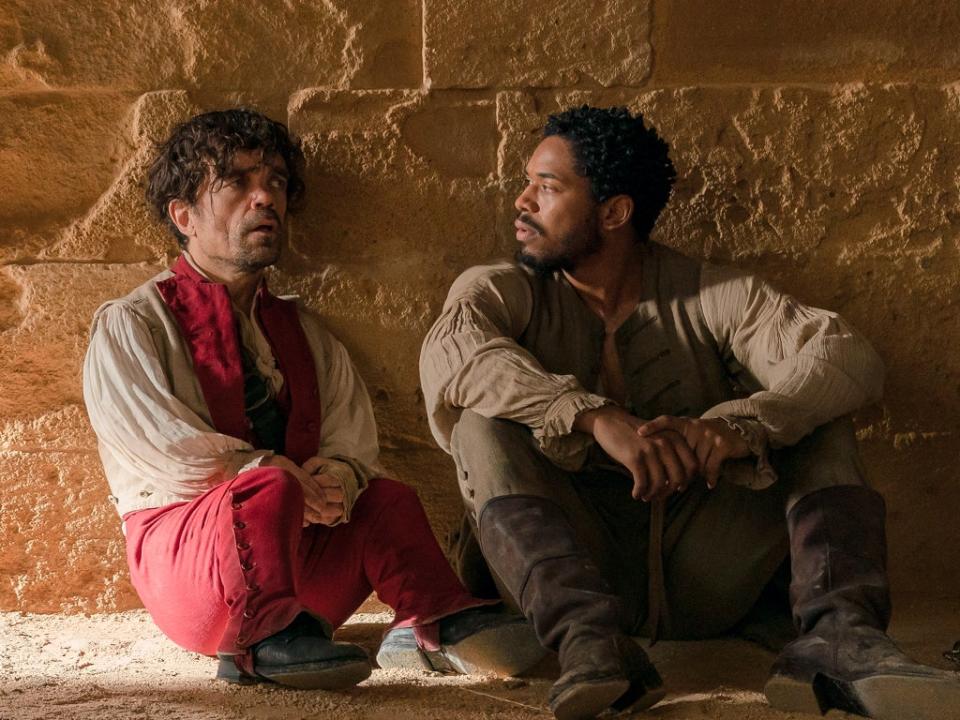Cyrano review: Peter Dinklage musical is too lavish and swoon-worthy to just be crushed by The Batman
Dir: Joe Wright. Starring: Peter Dinklage, Haley Bennett, Kelvin Harrison Jr, Ben Mendelsohn. 12A, 123 minutes.
Cinema has such a narrow definition of spectacle now. It’s all sexless bodies in neoprene suits slamming their fists through a floating mess of pixels. The rare alternatives feel fragile, always on the cusp of withering away from a lack of attention. I fear that’s what might happen to Joe Wright’s Cyrano – a lavish, cut-your-heart-out-and-smack-it-on-the-table musical adaptation of the 1897 play by Edmond Rostand. The film has been delayed, again and again, and now seems destined to be crushed under the heel of a new Batman movie. In another universe, it would be a hit.
Cyrano sees Joe Wright back in his comfort zone of maximalist, romantic epics, after Netflix’s The Woman in the Window thoroughly garbled the high-gloss psychological thriller genre. Atonement, Pride & Prejudice, Anna Karenina: Wright’s earlier films are escapist fantasies of their own breed, with emotions so big they could consume the sun. Cyrano is just as swoon-worthy. It’s a flutter of organza cloaks, brass buttons and delicate 17th-century dresses in pastel shades. They glide and pirouette across the weathered stonework of Noto, in Sicily, itself a treasure trove of baroque architecture.
This is Wright’s first musical, his actual source text being Erica Schmidt’s theatre production from 2018, starring Peter Dinklage as Cyrano and Haley Bennett as his unrequited love Roxanne – they’ve both reprised their roles for the film. The songs are composed by Bryce and Aaron Dessner of the eternally melancholic The National, with lyrics by Matt Berninger and Carin Besser. Shot during the pandemic, it is a looser, more relaxed Wright affair, and creatively driven by a network of romantic partners – Schmidt is married to Dinklage, Berninger is married to Besser, and Wright and Bennett are in a relationship.
That personal touch may explain the film’s honest, emotional intimacy – the kind that offsets some of the grandeur and reignites the often neglected sorrow of Rostand’s play. The name Cyrano, to many, conjures an image of Steve Martin successfully wooing Darryl Hannah in the sugary sweet Roxanne (1987). But Cyrano de Bergerac is a story of inevitable tragedy: a man who thinks he is unworthy of the love of his life, despite his intelligence and his valour, all because he feels damned by a single, superficial trait. In the play, it is the length of his nose. Here, it’s his height.
When Roxanne falls for a handsome but unlettered soldier, Christian (Kelvin Harrison Jr), Cyrano proposes to him a scheme: “I will make you eloquent, while you make me handsome.” Cyrano will write Christian’s letters of courtship and love Roxanne from afar. The prosthetic nose, the trademark of so many other onscreen Cyranos, is a thing of whimsical fantasy. Getting rid of it has allowed Dinklage to deliver something far more truthful, and he leans into the wounded, dashing resentment of a man forever burdened with being the smartest person in the room. He talks in the way that Rostand’s creation should talk, with sophisticated swagger, even if Schmidt’s script has excised many of the lengthier demonstrations of Cyrano’s wit.
The only true barrier between Cyrano and Roxanne’s love is the former’s sense of pride, and Wright’s version is very much a story about those who fear how vulnerable love makes them. The songs themselves aren’t all that catchy – not even in the way The National’s “Mr November” might rattle around in your head after a few listens – but they do seem to suit the material. There’s a quiet dreaminess to them that pulls along this lovesick cast of characters with a lightness of step. One number emphasises the sensuality of kneading dough, another sees frostbitten soldiers clutching final letters home – declarations that “heaven is where I fall”.

Dinklage’s voice, though not musically trained, has the same gravelly, rock star tone as Berninger’s. It works for Cyrano, and the unfussy nobility of a man who boasts “no buttons, bows, or braids”. Bennett is the stand-out vocalist of the film. Her Roxanne possesses both a fierce mind and a fierce heart. Ben Mendelsohn, clad in millennial pink and a powdered wig, turns up as rival suitor the Duke de Guiche. He’s doing the same villain shtick that he’s done a thousand times before, but is still yet to phone it in. He roars magnificently.
But the very best moments of Cyrano take place in near-silence, when all we can hear is the breathing of lovers enraptured by each other’s gazes. It’s exactly as to be expected from a director who once drove audiences wild with a shot of Mr Darcy’s flexing hand, its muscles electrified by the first touch of Elizabeth Bennet. Perhaps he can drive them wild once more.


